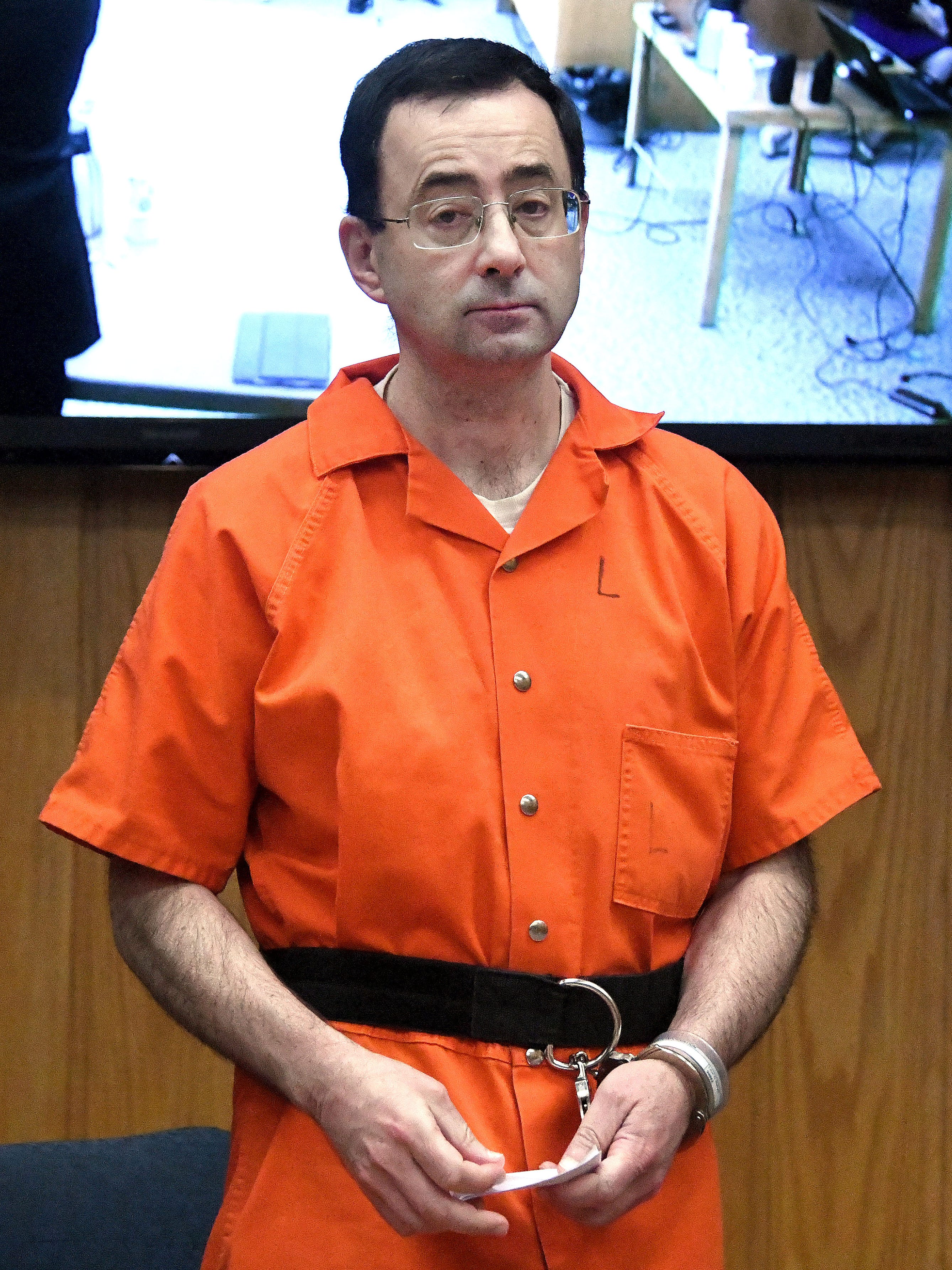Nassar assaulted in prison; court filing blames judge
 Kim Kozlowski
Kim Kozlowski
Less than six months after he began serving time in a high-security federal prison, inmates have assaulted Larry Nassar — possibly positioning him to move to another facility.
According to court documents filed Tuesday by Nassar's attorney in Ingham County Circuit Court seeking to appeal his sentence, he was assaulted in late May within hours of being released into the general population of the United State Penitenriary, Tucson, a high-security prison in Arizona.
One of his attorneys, Malaika Ramsey-Heath of the State Appellate Defender Office in Detroit, said she was unaware of the injuries he sustained and was not sure if he would be moved to another facility. She added that he has been removed from the general population of the prison.
"It offers additional some additional protection but I don't know if it would be properly classified as solitary (confinement)," said Ramsey-Heath. She said she visited him in prison recently but they focused more on issues to appeal in his case.
Ralph Miller, a retired Bureau of Prisons employee who specialized in sex offender designations in the Designation and Sentence Computation Center, said there are two places in a federal prison where inmates live: either the general population or the Special Housing Unit.
"That's the jail within the jail: lockdown 23 hours a day and they allow them out one hour a day for recreation," Miller said.
He said inmates are generally put in the special housing unit for disciplinary reasons or pending an investigation into such matters as an assault, introduction to contraband or attempting to compromise a staff member.
"You are either in there for an investigation or disciplinary," Miller said.
In court documents, Ramsey-Heath, along with Nassar's other state appellate defender's attorney, Jacqueline McCann, blamed Nassar's assault on Ingham County Judge Rosemarie Aquilina, who allowed more than 150 women into her courtroom to give victim impact statements over seven days in late January.
"Judge Aquilina made numerous statements throughout the proceedings indicating that she had already decided to impose the maximum allowed by the sentence agreement even before the sentencing hearing began," McCann wrote in the filing. "Thus, from the defendant's perspective the sentencing hearing was just a ritual.
"Instead of a proceeding to assist the judge in reaching a fair and just sentencing decision," McCann continued, "the judge used the nationally-televised proceeding as an opportunity to advance her own agenda, including to advocate for policy initiatives within the state as well as the federal legislatures, to push for broader cultural change regarding gender equity and sexual discrimination issues and seemingly as a type of group therapy for victims."
The judge allowed the proceeding to "devolve into a free-for-all" in which those who spoke could denigrate Nassar, sometimes with profanity, and even wishing physical harm on him, McCann wrote.
"The judge herself openly lamented that she could not impose cruel and unusual punishment upon the defendant, indicated her expectation that he would be harmed in prison, without condemning it, and finally proclaimed, with apparent relish, that she was signing his 'death warrant,'" McCann wrote.
She added that it was not surprising that a man attacked Nassar in an Eaton County courtroom in February, and Nassar was assaulted in the general population in federal prison.
"Unfortunately, Judge Aquilina's comments and conducting of the sentencing proceeding appeared to encourage this type of behavior."
Aquilina declined comment Wednesday.
Nassar is serving a de facto life sentence after pleading guilty to sexual assault and child pornography charges.
Miller said Nassar had broad media coverage before he entered the Tucson facility, and inmates have access to the news.
"He was constantly in the news," Miller said. "He is not going to be able to hide anywhere."
In an interview last week about security and staffing, Walt Shannon, president of American Federation of Government Employees, Local 3955, declined to address questions about altercations between specific inmates. But he said fights do happen in prison.
Shannon said he was unaware of the injuries sustained by Nassar, one of the most notorious and prolific child molesters.
“The inmates watch our staffing levels,” Shannon said. “If they’re going to do something … it is going to happen when staffing is low.”
In recent weeks, The Detroit News made numerous attempts to contact family members of Nassar, in person and via phone. Among them were Nassar’s ex-wife, his two sisters, two sisters-in-law and a brother-in-law. All declined comment.
Also declining comment in recent weeks was McCann. She flew to Arizona to meet with him in prison this month.
Through her assistant, Rita Jajjoka, McCann declined comment on Wednesday.
Nassar, 54, was incarcerated in February after more than 200 women gave impact statements over nine days in two courtrooms, accusing him of sexual assault while he was a sports doctor at Michigan State University and USA Gymnastics.
He is serving a 60-year federal sentence for possessing child pornography at USP Tucson, the nation’s only federal facility that is classified as high security and also has a sex offender management program.
About 70-80 percent of inmates are sex offenders in the Tucson population of 1,500, according to Miller.
If he lives to his release date of Feb. 23, 2069, Nassar will have to serve two other sentences in Michigan.
Based on the media attention Nassar's case received at the time of the victim impact statements in January and February, and the attention he continues to receive, this will continue to be a difficult case for the Bureau of Prisons, said Miller, now a consultant with FederalPrisonAuthority.com.
“Part of the mission statement of the Bureau of Prisons is to house inmates in facilities that are safe and this will be a priority, if it is determined that Nassar needs to be transferred,” Miller said.
Likely underway is an investigation to determine if there will be a continued threat to Nassar's safety, Miller said.
“If it is determined there is a threat to Nassar's safety ... he will be submitted for a transfer to another facility,” Miller said.
He predicted that Nassar could be transferred to USP Terre Haute in Indiana or USP Coleman II in Florida.
“While these two facilities do not offer the Sex Offender Management Program, they are facilities that house a higher number of sex offenders, individuals who have cooperated with the government and individuals who are not active in gang activity,” Miller said.
He added that based on Nassar's release date of March 23, 2069, he was assigned a Public Safety Factor by the Bureau of Prisons.
“Inmates who have more than 30 years remaining on their sentence require additional security measures to ensure the safety and protection of the public and will be housed in a high-security facility,” Miller said. “If it is determined that Nassar cannot be safely housed in a high-security facility, the Bureau of Prisons could waive his Public Safety Factor and place Nassar in a medium security facility.”
The assault against Nassar comes after the effects of his crimes are still reverberating. Though Michigan State University reached a historic $500 million settlement with more than 300 accusers of Nassar, civil lawsuit negotiations are still underway with USA Gymnastics, the United States Olympic Committee and others.
Numerous investigations are also still underway to identify how Nassar was able to molest girls and women for so long, including inquiries by the NCAA, the U.S. Education Department and federal lawmakers, who questioned Michigan State Interim President John Engler at a hearing Tuesday.
The Michigan Attorney General is also in the midst of an investigation that has resulted in charges against William Strampel, the former dean of the College of Osteopathic Medicine. Strampel recently retired from MSU.
kkozlowski@detroitnews.com